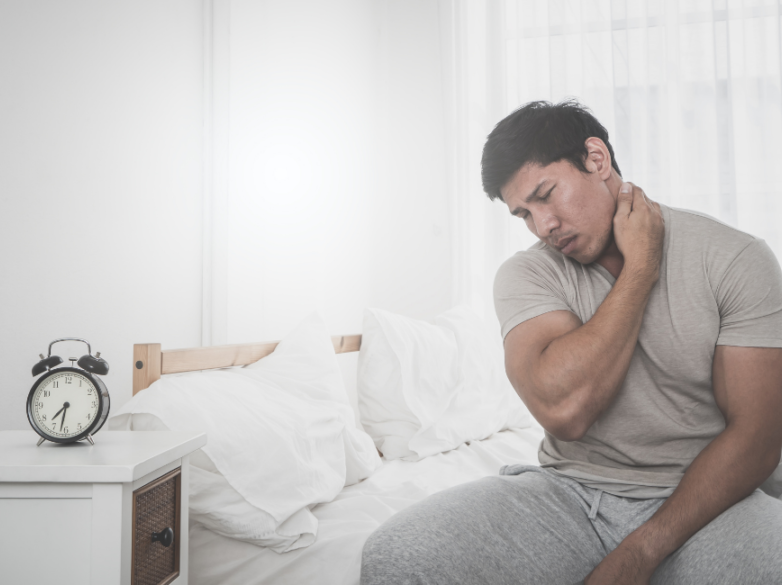
The Cycle Of Pain And Sleep Disturbance
Are you tired because you were in pain all night, but in pain because you’re tired? This vicious cycle is a result of sleep dysregulation and is often associated with fibromyalgia or chronic fatigue syndrome. However, sleep dysregulation can affect anyone and is way more common than you might think.
If you often feel in pain and suffer interrupted or low-quality sleep, then you don’t want to miss this blog!
WHAT IS SLEEP DYSREGULATION?

If someone is in pain, they will do less exercise in an attempt to not aggravate the pain. If you’re not moving your body enough your sleep quality is hugely affected. As a result of not sleeping as well, you become more fatigued. Fatigue amplifies pain, further disrupting your sleep.
There you have it, sleep dysregulation which causes you to enter a vicious cycle of pain and poor sleep that, in time, becomes worse and worse.
WHAT TRIGGERS SLEEP DYSREGULATION?

Sleep dysregulation can be triggered by a number of things, poor sleep itself can be the catalyst for a cycle of pain and sleep disturbance! Quality sleep is so important for people’s overall health, yet most people’s sleep hygiene is on the decline – they’re not getting enough and what they’re getting isn’t quality rest. Sometimes they get enough hours of overall sleep but not enough deep, restorative sleep. Remember, it’s all about quality and not quantity.
However, most people enter this cycle because they were either suffering from localised muscular or joint pain, an illness, anxiety, stress or poor mental health. This pain that they’re experiencing, or added stress in the body, will inevitably affect sleep quality and, if this isn’t addressed quickly, they can find themselves stuck in the vicious cycle of sleep dysregulation, which is difficult to break.
HOW DOES PAIN AFFECT SLEEP?
Pain is an indicator that something is wrong in your body. You can have acute pain, which is short term pain – often a result of an injury or short illness –, and then there is chronic pain, which is pain over a long period of time.
Those who suffer with chronic pain experience less deep sleep, wake up more often and find it more difficult to fall asleep. Why? Pain makes the nervous system more active, which keeps your body in a more alert state. As a result, it is more difficult to fall into a restful sleep and stay asleep for a full sleep cycle which includes REM and deep sleep.
Additionally, neurotransmitter signalling can be affected by pain, such as dopamine receptors, this is another reason why sleep can be disrupted as your body is literally signalling you to wake up to feel the pain because it needs to somehow alert you that there is something wrong.
HOW DOES SLEEP AFFECT PAIN?
So, pain makes it harder to experience quality sleep, but lack of sleep can increase pain and makes you more sensitive to the pain. Studies have shown that during brain scans, those with insufficient sleep were less able to pick up pain signals, evaluate them and activate natural pain relief when exposed to pain, than those who had benefitted from sufficient sleep.
I have already mentioned how pain affects dopamine signalling, thus affecting sleep. Well, lack of sleep reduces the activity in the nucleus accumbens, which, amongst other functions, increases dopamine levels to relieve pain. Therefore, your body is less able to deal with the pain that you are experiencing.
So, poor sleep not only increases your sensitivity to pain, amplifying the feelings of pain, but it also inhibits your body’s natural ability to reduce the pain. This causes all sorts of issues, as people can become reliant of painkiller medicine, which results in all sorts of health issues.
HOW TO BREAK THE CYCLE
In the short term, you will need to work on improving your sleep quality. In the long term, you will need to address the root cause of the pain that disrupted your sleep in the first place.
SHORT TERM

You need to work on your sleep hygiene to give yourself the best possible chance of improving your sleep quality and this, as a result, will help reduce the pain that you are experiencing.
This includes implementing morning and evening routines which are focused on enhancing your health. These may include avoiding blue light in the evenings, not eating your evening meal too close to bedtime, and following a series of practices to enhance your mental and physical health in the morning. My Morning Routine protocol gives you a step-by-step morning AND evening routine which covers everything you need to know to enhance your day and night.
Plus, to help you fall asleep I recommend using a good quality CBD. I use Dreem Distillery drops and I can’t emphasise enough how much they have enhanced my sleep quality – I know this for sure because I track my sleep religiously with an Oura ring!!
LONG TERM

You need to address the pain. Do you know where it’s coming from? If no, you need to test for imbalances in the body which could be resulting in discomfort and pain. Do you have other symptoms? The best way is to make steps towards overcoming the root cause for your pain is to work with an integrative health practitioner who will look at the whole picture, beyond the symptoms by running functional medicine labs.
To help reduce pain, it’s important that your diet is not aggravating your body further. An anti-inflammatory diet plus the right supplementation for you and your specific health issues can do wonders for reducing joint and muscular pain, whilst relieving discomfort in the body.
References:
https://www.sciencedaily.com/releases/2015/04/150430094131.htm
https://www.ncbi.nlm.nih.gov/pmc/articles/PMC6892491/
https://pubmed.ncbi.nlm.nih.gov/25915149/
https://pubmed.ncbi.nlm.nih.gov/31909797/
https://www.ncbi.nlm.nih.gov/pmc/articles/PMC4046588/

Follow Our Instagram For Exclusive Content





 د.إ / AED
د.إ / AED



Leave a comment